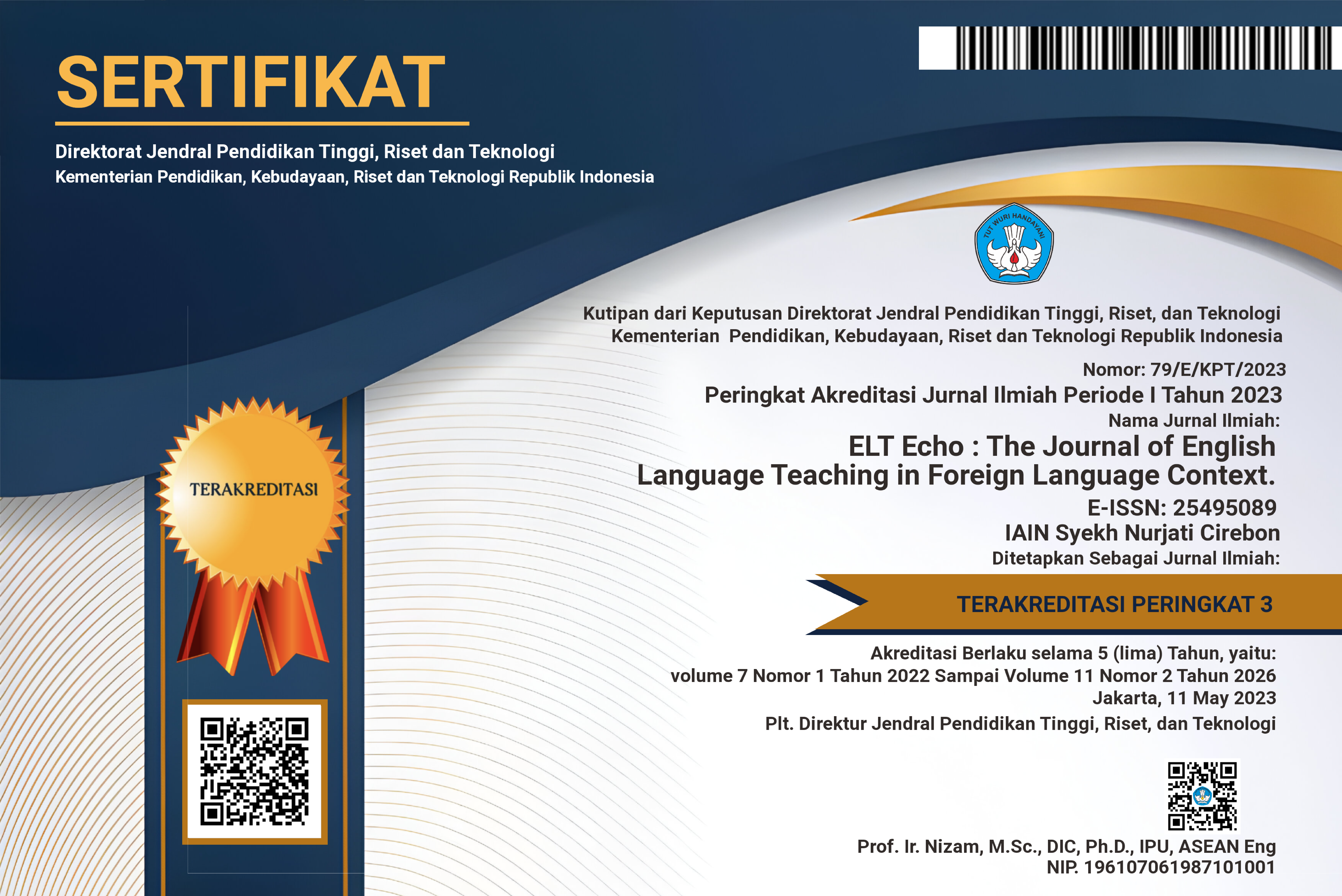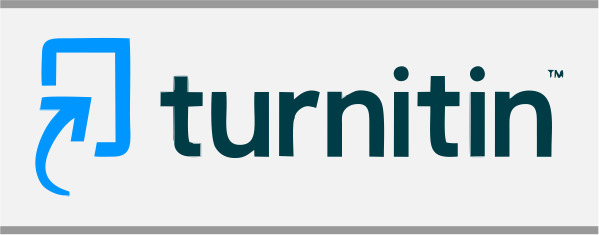GAMIFYING VOCABULARY LEARNING: THE EFFECTS ON STUDENTS’ ACQUISITION
(1)
(2) Universitas Riau Kepulauan
(3)
(*) Corresponding Author
Abstract
Keywords
Full Text:
PDFReferences
Al Qahtani, M. (2015). The importance of vocabulary in language learning and how to be taught. International Journal of Teaching and Education, III(3), 21–34. https://doi.org/10.20472/te.2015.3.3.002 Alotaibi, M. S. (2024). Game-based learning in early childhood education: a systematic review and meta-analysis. Frontiers in Psychology, 15(April). https://doi.org/10.3389/fpsyg.2024.1307881 Anastasiadis, T., Lampropoulos, G., & Siakas, K. (2018). Digital Game-based Learning and Serious Games in Education. Education, Game-Based Learning, Serious Games, Educational Games, Interactive Learning Environments, Collaborative Learning., 4(12), 139–144. https://doi.org/10.31695/IJASRE.2018.33016
Bakan, U., & Bakan, U. (2018). Game-Based Learning Studies in Education Journals: A Systematic Review of Recent Trends. Actualidades Pedagógicas, 72, 119–145. https://doi.org/10.19052/ap.5245
Bhuana, G. P. (2023). The Benefits and Drawbacks of Kahoot: Students’ Perspective. IDEAS: Journal on English Language Teaching and Learning, Linguistics and Literature, 10(2), 2224–2232. https://doi.org/10.24256/ideas.v10i2.3508
Dwirahmita, N. (2020). TEACHING VOCABULARY THROUGH THE IMPLEMENTATION OF GAME-BASED LEARNING FOR JUNIOR HIGH SCHOOL STUDENTS: THE TEACHERS’ PERCEPTIONS. Teaching Vocabulary, Game-Based Learning, Teachers‟ Perceptions, 10, 1–11.
Ergul, E., & Dogan, M. (2022). Using Game-Based Learning in Place Value Teaching in Primary School: A Mixed-Method Study. International Journal of Progressive Education, 18(5), 1–17. https://doi.org/10.29329/ijpe.2022.467.1
Hake, R. R. (1998). Interactive-engagement versus traditional methods. American Journal of Physics, 66(1), 64–74. https://pubs.aip.org/aapt/ajp/article-abstract/66/1/64/1055076/Interactive-engagement-versus-traditional-methods
Hasanah Lutfi, N. (2022). The Effect of Kahoot! Software on Students’ Vocabulary Mastery for Elementary Students: A Literature Study. Journal of Excellence in English Language Education, 1(3).
Hidayah, N., & Widiastuty, H. (2024). THE IMPLEMENTATION OF GAME BASED LEARNING ( GBL ) METHOD TO IMPROVE EFL STUDENTS ’ VOCABULARY MASTERY Institut Agama Islam Negeri Palangka Raya , Indonesia Edusaintek : Jurnal Pendidikan , Sains dan Teknologi Vol . 11 ( 2 ) 2024 | 557 Vocabulary learning . 11(2), 557–569.
M. Mubaslat. (2012). The Effectiveness of Games on Learning a Foreign Language. 32.
Maulida, N. N., Sukadi, S., & Rahayu, S. (2022). Effectiveness of The Implementation Game-Based-Learning in Increasing Student Learning Outcomes. Jurnal Penelitian Pendidikan, 22(3), 252–265. https://doi.org/10.17509/jpp.v22i3.50977
Muminjon, G. (2023). Review of the traditional approaches to modern language teaching and learning methods. 19.
Ningsih, N. L. A. B. H. (2023). The Importance of Game-Based Learning in English Learning for Young Learners in the 21st Century. The Art of Teaching English as a Foreign Language, 4(1), 25–30. https://doi.org/10.36663/tatefl.v4i1.492
Nuraini, N. L. S., Cholifah, P. S., Rini, T. A., & ... (2021). Review of the Effectiveness of Digital Game-Based Learning in Education. … on Education and …, 601(Icet), 251–254. https://www.atlantis-press.com/proceedings/icet-21/125964524%0Ahttps://www.atlantis-press.com/article/125964524.pdf
Pivec, M., & Dziabenko, O. (2004). Game-Based Learning in Universities and Lifelong Learning : “ UniGame : Social Skills and Knowledge Training †Game Concept 1. 10(1), 14–26.
Plass, J. L., Homer, B. D., & Kinzer, C. K. (2015). Foundations of Game-Based Learning. Educational Psychologist, 50(4), 258–283. https://doi.org/10.1080/00461520.2015.1122533
Purba, F. A., & Katemba, C. V. (2022). English Teachers Perception of Using Game-Based Learning ( GBL ) to Enhance Students ’ Vocabulary. 35–46.
Ramachandra, V., Hewitt, L. E., & Brackenbury, T. (2011). The Relationship Between Phonological Memory , Phonological Sensitivity , and Incidental Word Learning. 93–109. https://doi.org/10.1007/s10936-010-9157-8
Sartika, D., Khairinisaak, K., & Asmara, R. (2022). the Analysis of Students’ Difficulties in Writing Recount Text. Journal of English Education Program, 3(1), 59–66. https://doi.org/10.26418/jeep.v3i1.50496
Setiawan, H., & Phillipson, S. (2019). The effectiveness of Game-Based Science Learning (GBSL) to improve students’ academic achievement: A meta-analysis of current research from 2010 to 2017. REID (Research and Evaluation in Education), 5(2), 152–168. https://doi.org/10.21831/reid.v5i2.28073
Wahyuni, S., & Dewi, D. S. (2024). Impact of Video Podcasts on Speaking Proficiency in Indonesian Higher Education : A Study of Diverse Learning Styles. Al Ishlah, 16(3), 3041–3053. https://doi.org/10.35445/alishlah.v16i3.5735
Wang, A. I., & Tahir, R. (2020). The effect of using Kahoot! for learning – A literature review. Computers and Education, 149(May 2019), 103818. https://doi.org/10.1016/j.compedu.2020.103818
Yundayani. (2019). Investigating the effect of Canva on students’ writing skills. ENGLISH REVIEW: Journal of English Education, 7(2), 169–176. https://doi.org/10.25134/erjee.v7i2.1800.Received
Zhang, H., Li, J., Jiao, L., Ma, W., & Guan, C. (2016). The Adjustment and Effects of Vocabulary Teaching Strategies in Flipped Classroom. Creative Education, 07(14), 1966–1973. https://doi.org/10.4236/ce.2016.714199
Sugiyono, D. (2013). Metode penelitian pendidikan pendekatan kuantitatif, kualitatif dan R&D.
DOI: 10.24235/eltecho.v9i2.19077
Article Metrics
Abstract view : 226 timesPDF - 29 times
Refbacks
- There are currently no refbacks.
Â
This Journal is indexed by:
Â

This work is licensed under a Creative Commons Attribution 4.0 International License.










